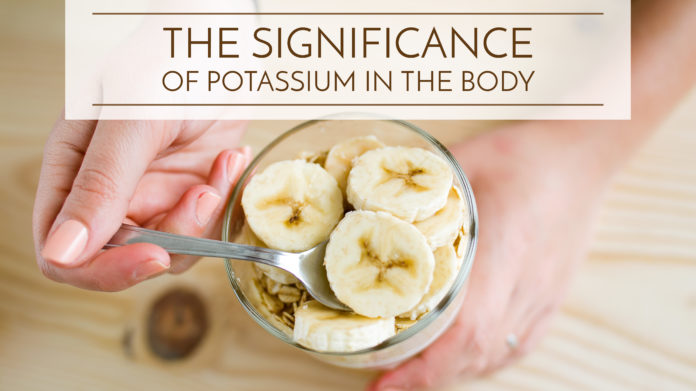Do you often feel weak and tired? Does your heart palpitates or your muscle cramps? If these usually happen to you, perhaps your body lacks potassium. When the supply is low, you are likely to experience fatigue, loss of appetite and nausea. When deficiency is severe, it can lead you to hypokalemia. Hypokalemia is a condition wherein the potassium status in your blood falls under 3.5 millimoles per liter (mmol/L). It can put you in a life-threatening situation when you do not supply your body the appropriate and recommended dosage.

Potassium is an essential mineral that your body needs.It is among the most essential macrominerals including phosphorus, magnesium, calcium, sodium, sulfur and chloride. Insufficient amount of potassium makes your body not to function properly.For instance, it increases your risk to acquire iron deficiency anemia.The normal level ranges from 3.5 to 5 millimoles per liter (mmol/L). An adult like you should supply your body at least 4,500 to 4,700 milligrams (mg) of potassium per day. Getting the recommended dosage of potassium helps your aging body to stay fit and healthy.
How Potassium Functions In Your Body?
Potassium plays many roles in your body. It is responsible for muscle control, nerve function and even for blood pressure regulation. It keeps your bones healthy, reduces your anxiety and stress level as well as boosts metabolism and nervous system. Alongside sodium and other compounds, it acts as an electrolyte which regulates and maintains fluid as well as acid-base balance in your body. Nerve impulse progresses because it alters the membrane potential when it leaves the cell during initiation of sodium-potassium exchange. Through this, it has the ability to regulate your heartbeat and produce muscle contractions.

Furthermore, potassium plays a role in cellular biochemical reactions by utilizing energy released during metabolism. When it is dissolved and discharged in fluid, it generates charged ions enabling electricity to perform in your body. It allows amino acids in the cell to create proteins. It makes the energy metabolism to boost. Also, it assists in converting glucose to glycogen—a reserved energy stored in the liver during carbohydrate metabolism.
Benefits Of Potassium
As you have read above how important potassium is in your body, there are more reasons why you have to make sure to include potassium-rich foods in your dietary plan.
Keeps Your Heart Healthy
Supplying your body with the recommended potassium dosage will benefit your heart. Potassium can keep your healthy which gives you a worry-free life especially if you are genetically have a weak heart. It is because this mineral has the ability to control and reduce blood pressure levels by removing those extra sodium in your body.
Helps You Prevent Osteoporosis

Are you having a hard time going upstairs? Maybe your bones are getting weaker without realizing it. Potassium, just like calcium and other minerals, it assists you in having and maintaining a strong bone. When your potassium supply is sufficient, acidosis can be prevented. Acidosis is a condition wherein your body fluids and tissues have too much acid. This condition affects your bone mineral density and muscle contraction as well as decreases your calcium status. With potassium, your muscle and tissue mass can be preserved lowering your risk of developing osteoporosis. It assists in maintaining your bone’s durability and strength.
Supports Your Mental Health
Does your anxiety and stress level is always high? A dose of potassium can lower the bar. Low level of potassium can lead to hypokalemia. Some of its symptoms include depression, mental fatigue, unexplainable mood swings, and psychosis—a condition where a person has lost his/her touch with reality. If an apple a day keeps the doctor away, banana—the best source of potassium—has the ability to keep the psychologist and psychiatrist away. It is due to the fact that potassium neutralizes and stabilizes those hormones in your body including stress hormones, cortisol and adrenaline. It also produces positive hormones that can make you happy.
Reduces Your Chance Of Having A Muscle Disorder
One’s potassium role in the body is the muscle contraction. If you always suffer from muscle cramps, spasms, stiffness, tingling and numbness, particularly in your arms, legs, feet and hands as well as other muscle pain, you better eat potassium-rich foods. Potassium assists in blood flow regulation to your muscles and when low, it prevents your muscle cells to receive appropriate amount of oxygen. Thus, it causes your muscles to ache and stiff.
On the other hand, your brain sends signal to your muscles indicating whether to start or stop the contraction. When your body has a low level of potassium, weaken the nerve signal because your brain cannot effectively send signals to your muscles which prolongs the contraction resulting to muscle cramps, numbness and tingling.
Maintains fluid balance in your body
Body’s fluid should be maintained to ensure that your organ system will function properly. Too much water in the body is unhealthy for you because it increases your risk of water retention that may bring you complication. When not treated immediately, it can cause you kidney stones, strokes and osteoporosis. Lucky you because potassium does the magic. It helps the cells in maintaining water level in your body. It also adds up to urine production and decreases sodium level.
What Happens If You Have Too Much Or Too Little Potassium?

As discussed above, when you are potassium deficient, you are likely to experience unexplainable fatigue, heart palpitations, nausea, chest pain, trouble breathing, and muscle disorder. When the shortage is severe, you will develop hypokalemia. You lack supply of potassium in your blood that is why you always get tired easily because your cells do not receive enough oxygen.
On the other high, too much supply is also bad for your health. Hyperkalemia is a condition which you have higher dosage of potassium in your body than normal. Just like hypokalemia, symptoms for this condition are the same. So, when you experience the above signs, better consult your doctor.
Sources Of Potassium

Potassium is the most abundant mineral in your body. It is rare that a person is potassium deficient because this mineral can be found in various foods such as the following:
- Vegetables—parsley, lettuce, spinach, lima beans, broccoli, ripe tomatoes, potatoes, accord squash, white beans, kale, and carrots.
- Fruits—banana, avocado, sweet potato, citrus fruits, apples, dried apricots, and kiwi
- Seeds and nuts—raisins, almonds, grains, peas.
- Meat—chicken.
- Herbs—sage, red clover, catnip, horsetail, hops, skullcap, nettle, and plantain.
- Fish—Salmon, flounder, cod, and sardines.
- Fresh juices like coconut water
- Milk
- Clams and eggs
It is important to avoid too much caffeine intake, alcohol, and cigarettes because it decreases potassium absorption.
Final Thought
Potassium plays a significant role to keep you healthy. It is among the seven macronutrients which your body needed in order to stay active and fit.So next time you potassium-rich food, savor it because it brings numerous benefits to you. When you both have too low and high of supply bring you harm and can cause you chronic diseases and conditions. That is why, when you experience those symptoms, consult your doctor immediately to know the proper intervention. Make it a habit to monitor your K level and consume more chia seeds to balance your life.






































